
Related
Guests
- Victoria Jabara Williamsthe sister of Khalid Jabara, who was killed by a neighbor outside his Tulsa, Oklahoma, home just over a week ago.
- Rami Jabarathe brother of Khalid Jabara, who was killed by a neighbor outside his Tulsa, Oklahoma, home just over a week ago.
- Dr. Mohammad Abu-Salhahis daughters, Razan and Yusor Abu-Salha, and son-in-law, Deah Barakat, were shot dead last year in Chapel Hill.
In this web-only special, we continue our look at this month’s killing in Tulsa, Oklahoma, of Khalid Jabara and last year’s triple killing in Chapel Hill, North Carolina, of Deah Barakat and two sisters, Razan and Yusor Abu-Salha. Both killings have been described as anti-Arab hate crimes. We speak to Khalid’s brother and sister, Rami Jabara and Victoria Jabara Williams, and to Dr. Mohammad Abu-Salha, the father of Razan and Yusor.
Related Segments
Hate Crime in Tulsa: Khalid Jabara’s Family Speaks Out After His Murder by Racist White Neighbor
Father of Muslim Women Murdered in Chapel Hill to Jabara Family: 'I Know How You Feel'”
Transcript
AMY GOODMAN: This is Democracy Now!, democracynow.org, The War and Peace Report. I’m Amy Goodman. In Oklahoma, funeral services were held Friday for Khalid Jabara, a Lebanese-American man police say was shot dead by his next-door neighbor in a possible hate crime. Police say Stanley Majors will be charged with first-degree murder. The August 12th killing came less than a year after Majors was arrested and jailed for running over Jabara’s mother with his car. At the time, the mother, Haifa Jabara, already had a restraining order against Majors, after he had threatened and harassed her.
We are going to Tulsa, where we’re joined by Khalid’s brother and sister, Rami Jabara and Victoria Jabara Williams. We’re also joined in Raleigh, North Carolina, by Dr. Mohammad Abu-Salha. His daughters, Razan and Yusor Abu-Salha, and his son-in-law, Deah Barakat, were shot dead by a neighbor last year in Chapel Hill.
Dr. Mohammad Abu-Salha, as you listened to Victoria and Rami, talk about the restraining orders, the jailing of Stanley Majors and then releasing him without even telling them. Can you talk about the history of the harassment of your children and your son-in-law by the next-door neighbor, as well, who ultimately was charged with the murder of your three children?
DR. MOHAMMAD ABU-SALHA: Absolutely. Craig Hicks, actually, has a history of picking on parking spots in his neighborhood, and that has gone for years. Everybody was aware of that. Even towing companies stopped showing up in that area. But the night of the crime, I’d like to say that my daughters’ cars were parked outside his zone. They have stopped parking in that zone a long time before they were murdered. Deah’s car was parked in his own spot, and Deah has actually distributed a diagram to all his friends and family where they should not park their cars. So, he took all measures to appease his neighbor, who kept on harassing them and kept on picking on them for everything.
You know, even if their friends visited and they were saying goodbye by the door outside, he would hear them from the window upstairs and come downstairs running and say, “You’re loud,” just for saying goodbye. And our children were not loud or party animals at all. They were very decent citizens, calm and collected and highly educated, athletic, charming, very peaceful. They actually were very well-known philanthropists. And they would not pick up a fight with him at all over anything. If anything, I will tell you, my son-in-law, Deah Barakat, and his siblings, Suzanne and Farris, and his parents are well known as a family in Raleigh who would give anything to anybody who asks for it. If you fight with them over a parking spot, they will give you their car. So, all his allegations were false.
And he told my daughter Yusor on two occasions, while yelling at her condescendingly, that he hated how she dressed and how she appeared. Yusor was very beautiful. And the last I can remember of her is a cold stone face with grey, dead, glazed eyes and drooping eyelids and a bulging forehead, because of the bullet in the head that exploded her skull. He, on the night of the crime, culminated in knocking on their door and walking in and shooting them all together. And after he shot Deah many times, he shot both Yusor and Razan in the top of their heads to make sure that the bullets go the brainstem and don’t leave them a chance to survive. So, he’s a trained killer.
What surprises me is that Yusor did not call the police. But then I’m not surprised, because Yusor, when my wife saw Craig Hicks talking to her once and yelling at her, my wife was angered, and she wanted to go back and talk to him; Yusor said, “No, Mom, wait. He’s our neighbor. We’re going to treat him with kindness and change him.” This is how innocent she was.
Yusor, Deah and Razan were feeding the hungry in downtown Raleigh every weekend they did not have an activity going on. They would cook in our kitchen or the Barakats’ kitchen, and loads of food, and take in their car trunks and feed the hungry themselves. They built houses for Habitat. They went to the Syrian refugee camps in Turkey to treat the refugees and provide dental care. Razan wanted to go with them the July after she was murdered, but she did not survive long enough to go. Still running Refugee Smile out of North Carolina every year, equipped with dentists from UNCR community who go and treat these refugees for a week or two every year. So this is the kind of children we’re talking about, very good American citizens that did not differ from anybody else, except for wearing the Muslim attire for the girls.
Also, need to notice that Craig Hicks did not ever brandish his gun to anybody, until he saw these two Muslim girls, my daughters, wearing the hijab. And then he started to brandish his gun every time he talked to them, and then, on the night of the murder, shot them to death.
AMY GOODMAN: As you talk about the—your children, your daughters and your son-in-law, Victoria Jabara Williams and Rami Jabara, could you tell us the story of Khalid? Tell us the story of your family?
VICTORIA JABARA WILLIAMS: You know, my family came in the early '80s, as you had said, from—because of the civil war in Lebanon. And they came—you know, they chose Tulsa, because they had some family here already. And, you know, they found it to be a relatively safe place to live, good schools. And, you know, we grew up in a typical, I think, suburban upbringing. And Khalid, our brother—you know, I'm the oldest, and Khalid is the middle, and then Rami is the youngest—you know, he was always—you know, he was always the one that—he was the funny one. He was—you know, we always joke. He’s the good-looking one. He just had a heart of gold. He would do anything for my parents and for our family. You know, he was quieter, but then, when you got him out of his shell, he was just the funniest, most gregarious person. You know, we joke we got all of our family jokes from him.
He—you know, in the last, I would say, eight years or so, he really—my dad’s health declined, and so he took care of my dad and helped my parents with their business and really just focused on—diligently on providing care for him. And I know that after my mom got hit, and my dad’s health also was at risk, I mean, he was just—he was there 24/7, sleeping in the hospital, sleeping—you know, making sure my dad had all of his medication, bringing—you know, doing whatever it took to keep my parents’ spirits up at the time. He was just that—
AMY GOODMAN: When did Stanley Majors come into your life? When did he move next door?
VICTORIA JABARA WILLIAMS: Oh, 2012?
RAMI JABARA: I think it was around 2012. His partner had lived in the house for several years before that. And the relationship with him was—
VICTORIA JABARA WILLIAMS: Just neighborly.
RAMI JABARA: —cordial and, you know, fairly normal.
VICTORIA JABARA WILLIAMS: Yeah. And as soon as Stanley Majors came, I guess, we didn’t realize at the time—we didn’t know anything about [inaudible]. He was in jail, apparently, in California for similar offenses. He came and moved, you know, into the house next door with his spouse and just hyperfocused on, you know, my parents—my mom, specifically—and my brother, just hyperfocused. And that’s when the name calling started. That’s when the tapping on the door started. That’s when the photographs started. He also had a similar issue and fixation on us parking. You know, we live in a residential neighborhood. And so, my parents would have a lot of friends and guests over, and we would park on a curb. You know, we shared a curb. And he would call the police repeatedly, even though the police said, you know, “Can’t do anything. This is not your curb. You don’t own it.” Just anything to harass us and just traumatize.
AMY GOODMAN: In fact, Dr. Mohammad Abu-Salha, the police originally talked about this as a dispute over a parking space, is that right? The killing of your daughters and son-in-law.
DR. MOHAMMAD ABU-SALHA: Well, I need to expand a little bit on this. You also need to know that the police has recanted that statement. And Chief Blue has stated to the media that it was a statement released too early and that there was more to this than we—and that the police was going to investigate. The FBI—the FBI was involved.
Let me tell you more about the parking dispute thing. On the night of the crime, the cars were not in the parking spaces at all. And Deah was in his own spot. Craig Hicks had no reason to kill them at all. He knocked on the door. We do have evidence we cannot share, but watch the trial. I promise you, Amy Goodman, when the trial is on and heated, you will call me again for another interview when you see the evidence that I cannot speak of. He killed cold-blooded, premeditated, planned, took him just a few seconds to finish his execution of them. It was execution style, the three of them. And on his way out of the apartment, Deah was still breathing. After he was riddled with bullets, he shot him in the mouth to finish him.
The parking dispute thing was released, actually, the night of the crime, hours before the police even talked to them. Our children were murdered at 5:05 p.m. or 5:07 p.m. We were formally informed that they were murdered at about 11:45 p.m. We were kept in a clubhouse in the neighborhood for four-and-a-half hours without being told that they were dead, though they were dead. And the statement of parking dispute was released while we were waiting. And it was taken from probably the mouth of the murderer, who, when he turned himself in, lied. The proof that he lied is that he also said that Deah aggravated him and picked up an argument with him. But just wait and watch the court, and you will see how that was not true. If you want to know the nature of our children, just go to www.ourthreewinners.org and watch the little video we placed on the bottom of that endowment website for them, and hear and watch what is said about them. The parking dispute allegation was premature. And I think our families feel insulted and humiliated that this was raised on the night of the murder, even before we were told of their murder. It was, to us, disrespectful to three philanthropists who were lying on the floor with bullets in their heads. And it was totally incorrect.
Also, we do have a feeling that this statement of a parking dispute could be just something that had to be said to defuse what could turn out to be a political situation, because the whole world was watching this crime within seconds of it happening—on Facebook, TV, international TV, throughout Europe, the Middle East, Asia, Africa, everywhere in the world. I think that statement was biased, and I hope, and I’m confident, that the police in Chapel Hill will take the earliest opportunity to correct that narrative.
AMY GOODMAN: And what about the media’s coverage of what took place, Dr. Mohammad Abu-Salha, before we go back to Victoria and Rami?
DR. MOHAMMAD ABU-SALHA: The media, of course, most of the media, emphasized the parking dispute concept. Of course, imagine the tables have turned. Imagine that it was my son who walked in on a Christian white family and killed three people who are not armed. What would the media be saying next morning? They will call him a terrorist. I think the police will be probably rounding up some of his friends, too, and his family, to investigate and interrogate them. Whereas when Craig Hicks committed his crime, a lot of media talked about parking dispute.
But all well-meaning Americans, all honest and transparent Americans were aware it was a hate crime. They supported us just like brothers and sisters. Suffice it to say that NC State University Chancellor Woodson issued six scholarships after our children to honor them in perpetuity, and they will be given out annually forever. UNC, University of North Carolina, designated a service day annually for them and two awards annually in their names. They were awarded the Martin Luther King Award that year, 2015, at UNC, as well, for public service. So, many Americans, most Americans, know it was a hate crime. I received tons of letters and cards in the mail after the crime happened. And even patients come to the office—and, by the way, I make a living by seeing 25 to 30 patients a day, and I’ve been doing this for 22 years. My brother-in-law, Namee Barakat, the father of Deah, has—owns businesses in Raleigh, and he has hired tens, if not hundreds, of Americans, and he’s loved all over town. And homeless people know him by first name, because he feeds them himself, too, and takes care of them and gives them a job when he can.
So, this is the nature of our families, and this is the nature of the crime and the criminal. And the media, I think, was biased in many ways. I was interviewed once by one of the major channels—I’m not going to mention names—and suffice it to say, I was given a few minutes on TV, and then, before me and after me, it was segments about ISIS. So, we’re really being seen in a very negative shadow, as Muslims living in America, millions of us living in America, and living the American life every day.
AMY GOODMAN: I wanted to turn to Victoria Jabara Williams and Rami Jabara. You are Arab Americans, Arab Christian Americans. You clearly felt that you were being—your family was being harassed. Your brother felt he was being stalked, his parents, your parents, as well. What are you demanding of the police right now, and the media?
RAMI JABARA: I think we want to know—we want them to take ownership on where the ball dropped on, you know, all the layers involved in this whole incident. You know, the big question is: How many red flags does it take to keep somebody in custody until they can face trial. You know, I’m not sure where exactly the miscommunication was, but it occurred on several levels, from the DAs to the judge to the police, you know, not acting as perhaps you would think. And it’s just really troubling to be your own victim’s advocate. Me and my wife are both attorneys, although we don’t practice criminal law. We followed up with every—at every opportunity we could, and still we got this result. And it just—it’s very difficult for me to understand, because if we followed up this much, we just—we don’t know what’s happening to the other victims out there who are, you know, seeing similar instances of hate and, you know, attacks against them. It’s just—it really just is sad to hear.
VICTORIA JABARA WILLIAMS: I think even the police went on record in the very beginning on one of the news channels. They said, you know, “Knowing what we know now,” or “Had we have known”—I’m paraphrasing, but essentially, you know, “If we knew what we should have known, we would have done things differently.” And it’s like, well, you know, let’s—it’s too late. We don’t want to hear that.
AMY GOODMAN: I mean, Stanley Majors had run over your mother, when she already had gotten a protective order.
VICTORIA JABARA WILLIAMS: Right.
AMY GOODMAN: You would think—and because there was this protective order, I mean, he could not have a gun. And here, your brother was calling, saying he was afraid and that he had a gun—
VICTORIA JABARA WILLIAMS: Yeah, yeah.
AMY GOODMAN: —that Stanley Majors had a gun. The police came and said there was nothing they could do, after he had been released on bond?
VICTORIA JABARA WILLIAMS: Yeah. Didn’t they look at the background of the story? Didn’t—was there no continuity? I mean, that’s what we’re noticing, and throughout this whole, you know, experience, is that no one’s talking to each other, as Rami said, from the DAs to the judge to the police officers. So it’s—every time a phone call is made, every time paperwork is filed, it’s like it’s a brand-new day and it’s a brand-new case. And that’s—that’s the most frustrating part, is that, you know, there are no checks and balances throughout the process, or, if there are, either they weren’t followed or they need to be changed and looked at again.
AMY GOODMAN: Have the police referred to it as a hate crime?
VICTORIA JABARA WILLIAMS: In the beginning, they also mentioned that there was a neighborly dispute. And I think they—I don’t know if they’ve officially retracted that, but that in the media they haven’t talked about it being a dispute since, you know, the first couple of days since the incident. You know, the police haven’t talked about it being a hate crime, to my knowledge. And, you know, we’re—
RAMI JABARA: I think they’re still investigating—
VICTORIA JABARA WILLIAMS: Yeah.
RAMI JABARA: —and making that determination, since it’s so early in—
VICTORIA JABARA WILLIAMS: Yeah.
RAMI JABARA: —in the investigation.
AMY GOODMAN: Dr. Mohammad Abu-Salha, do you have words of wisdom or advice you’d like to share, wisdom you don’t want to have but that you have, after your children and son-in-law were killed?
DR. MOHAMMAD ABU-SALHA: Absolutely. And learning from the Jabara family’s tragedy, I think that we, as a nation, need to have a hate crime law that has more teeth to it. Our hate crime laws are very impotent. The Department of Justice is reluctant to try for hate crime, because the law is very vague and gives the criminals a lot of leeway. Also, we need to have hate crime laws in every state, which we don’t have. Like, in the state of North Carolina, we have a law that’s called ethnic intimidation. I don’t know what that means; it sounds funny to me, actually.
Also, when the police hears about somebody harassing or irritating people or aggravating or threatening or picking fights with people, they should go ahead and disarm them. I know that the right to carry arms is a sacred thing in America, and I’m not against that, I don’t pick up that argument. But if somebody is showing ill judgment or prejudice, they should be ill armed—they should be disarmed immediately, on the first complaint.
Also, I think the police should be careful before they issue statements, especially when the victim is of different ethnicity or faith, knowing that in this country we have all kinds of faiths and religions. We are a democracy that takes pride in being able to separate church from state, but it is insulting that many prominent politicians are talking religion as part of their campaign, and painting groups with very dark brushes to just become president.
I also think we should look at what we’re teaching our children in school, in history lessons and social studies. We need to teach our children in America to respect other nations and cultures and religions. Even when our government is in a political or military conflict, we still need to respect people who are living on our soil here and their rights. There is a lot to be said. I wish that the White House and the Department of Justice would carry a TV advertisement campaign to teach Americans that we’re in conflict with a nation or a country, that does not mean that all this nation’s subjects who came to our country here and make it—made it their home should be subject to that conflict. We are Americans. We’ve been here for decades. We are here in the millions.
And I hate to say, but I really think that Majors murdered Khalid thinking he was a Muslim, not just an Arab. And that’s unfair. And, you know, I know a lot of Lebanese Christian people who are just sweet and charming and generous. And in the Middle East, Christians and Muslims have lived together for 14 centuries, until modern politics began to divide them since the 1940s or ’50s, after World War II and when we had the Cold War and other campaigns.
So, I have a lot of advices to give, and I think I can give more advices in light of what happened. We need to be heavy-handed on—in punishment of these criminals who zone in on a target that is—that they hate also.
AMY GOODMAN: I wanted to ask—
DR. MOHAMMAD ABU-SALHA: But is there—
AMY GOODMAN: I wanted to ask Victoria and Rami about this issue of the climate today, you know, whether you’re Christian or Muslim, if in this presidential season you see the rhetoric around Muslims, around immigrants, does it make you more afraid?
RAMI JABARA: I mean, you are definitely starting to—in the last couple years, I feel like, and especially the last year, you’re starting to see more of this rhetoric. And it does seem to inflame this whole country. And, you know, I have been aware of it. And I think me and my family have been—we have talked about that, that it has been growing as of late.
AMY GOODMAN: I wanted to turn to Donald Trump being interviewed on 60 Minutes with Mike Pence. Host Lesley Stahl asked about Trump’s call to ban Muslims from coming to the U.S.
LESLEY STAHL: Mr. Trump, you have called for a temporary ban on Muslims entering the United States. Do you agree with that?
GOV. MIKE PENCE: I do. In fact, in Indiana, we suspended the Syrian refugee program in the—in the wake of a terrorist attack. We have no higher priority than the safety and security of the people of this country. And Donald Trump is right to—
LESLEY STAHL: Now, in December—
GOV. MIKE PENCE: —articulate that view.
LESLEY STAHL: In December, you tweeted—and I quote you—”Calls to ban Muslims from entering the U.S. are offensive and unconstitutional.”
DONALD TRUMP: So you call it “territories,” OK? We’re going to do territories. We’re going to not let people come in from Syria that nobody knows who they are. Hillary Clinton wants 550 percent more people to come in than Obama, who doesn’t know what he’s doing. So we’ll call it—
LESLEY STAHL: So you’re changing your position.
DONALD TRUMP: No, I—call it whatever you want. We’ll call it territories. OK?
LESLEY STAHL: So not Muslims.
DONALD TRUMP: The Constitution, there’s nothing like it. But it doesn’t necessarily give us the right to commit suicide as a country, OK? And I’ll tell you this. Call it whatever you want—change territories—but there are territories and terror states and terror nations that we’re not going to allow the people to come into our country. And we’re going to have a thing called extreme vetting. And if people want to come in, they’re going to be extreme vetting—we’re going to have extreme vetting.
AMY GOODMAN: Do you think comments like these of Donald Trump and Indiana Governor Pence fuel, Victoria and Rami, fuel the hatred in this country?
VICTORIA JABARA WILLIAMS: I mean, absolutely. It’s playing on a fear and on an ignorance that absolutely comes from top down. And if that type of rhetoric is being, you know, blasted out, then people are going to feel it. And it is definitely making an impact, unfortunately.
AMY GOODMAN: And, Dr. Mohammad Abu-Salha, as you listen to the words of Donald Trump and Governor Pence, your thoughts today, a year after your family members, your daughters and son-in-law, were murdered?
DR. MOHAMMAD ABU-SALHA: Actually, just like the Khizr Khan family said, it’s sad to see politicians run for presidency without reading the Constitution. It’s also sad to see candidates not aware of what the government is actually doing. The American government is already screening all immigrants very—in a very sophisticated way. They have background security clearances on everybody before they grant them immigration rights. And they have top security measures in airports and ports, and they’re improving security on the south border. The issue is not that. The issue is that you can admit anybody to the country, and they can become a crazy or lunatic radical the next day if somebody reaches them.
If anything, those statements not only fuel hatred in America and divide us more than we’re divided already—and I hope we do not get more divided anymore—but they also are a weapon in the hands of the extremists and the radicals, who are recruiting vulnerable young people who are either aimless or jobless or failing in life or don’t have any direction, and when they see themselves being hated in the beacon of democracy, in a country that defends democracy and freedom and liberty and separates religion from state, when they see that happening, these young people will be an easier prey for recruitment by radical organizations. So, these statements are really an arm in our enemies’ hands. And if anything, I think any candidate who wants to be a president of this country should be a uniting person. And if that candidate uses racially motivated statements, they should be disqualified.
AMY GOODMAN: Now, Stanley Majors is not being held in jail right now for killing your brother Khalid, but is in a hospital, is that right?
RAMI JABARA: We had early indication of that. I’m not really sure. I believe he’s in custody now, but I know he was transported to a hospital for something related to his health. But—
VICTORIA JABARA WILLIAMS: But I believe it’s a—I mean, he’s still in custody. Although I should say that, you know, regardless of—you know, we were talking to my parents, and, you know, my mom said, even if they tell us he’s going to jail or going to be held in custody, she doesn’t believe—she doesn’t believe in the system, that they’re going to keep her safe.
AMY GOODMAN: And—
RAMI JABARA: I mean, yeah, it’s very difficult to really believe in that system when it has failed on so many levels. And the issue of bond is so important, and it needs to be addressed. Especially the risk that the defendant poses to the community is of the most importance—
VICTORIA JABARA WILLIAMS: Yeah.
RAMI JABARA: —when assessing if a defendant should be let out on bond while he awaits trial, he or she awaits trial. And in this case, in this situation, you know, there were, again, so many gaps and so much miscommunication. It’s like they didn’t even realize they couldn’t put the defendant and the victim, our mom and our family, together, like this was the same guy doing the same thing. And with, you know, all the technology that we have in the world, just being able to connect those dots is so important.
AMY GOODMAN: That the man doing this to your mother was the same man doing this to your brother.
VICTORIA JABARA WILLIAMS: Yeah.
RAMI JABARA: Right.
VICTORIA JABARA WILLIAMS: Absolutely.
RAMI JABARA: And the man that violated the protective order the first time was the same man that ran over my mother about six months later. So, you know, putting these together in a system, it’s like there’s one hand doing one thing and another hand doing the other, and they don’t communicate between each other. And it’s just, you know, inexcusable—
VICTORIA JABARA WILLIAMS: Yeah.
RAMI JABARA: —that that kind of—those kinds of failures occur.
VICTORIA JABARA WILLIAMS: Now everyone’s paying attention, now, only after the fact that, you know, my brother was killed. The DAs are responsive. The police is responsive. You know, now people are starting to pay attention.
AMY GOODMAN: Are there any other thoughts that you’d like to share with us, Victoria Jabara Williams and Rami Jabara? The response of the country to what’s happened to your brother? And how are your parents right now? He was their main caretaker.
VICTORIA JABARA WILLIAMS: Yeah. I mean, the response has been really pretty overwhelming, overwhelming on a community level, just from an interfaith level. It’s just been very supportive, and also, you know, nationally, of course, and throughout the world. People are outraged at this incident and that it was done in such a violent way, especially if it could have been prevented, given that we went through the—all the right things to help protect ourself.
You know, my parents, you know, they’re—it’s getting quieter now. Most the family have left. You know, my dad, because he was the one that saw my brother, he’s not doing great, to be honest, with his health, as well as just emotionally, psychologically. He suffered a lot of trauma and grief. And through that trauma, he’s blocked out a lot of—you know, he’s carrying a lot, and he’s carrying it silently. And so we’re working through what that looks like and providing him immediate care. And I think that’s our first priority.
AMY GOODMAN: I want to end with the words of Dr. Mohammad Abu-Salha’s daughter Yusor. Last year, before she was killed, she did an interview with her third grade teacher, Mussarut Jabeen, that was part of Dave Isay’s StoryCorps. In fact, all three of the victims attended Jabeen’s school. After the shooting last year, StoryCorps produced a short piece based on that interview. It ends with a brief comment from Mussarut Jabeen recorded after the murders.
LIYNA ANWAR: I’m Liyna Anwar, one of the producers here at Storycorps. Today we’ll hear the voice of one of the students killed in Tuesday’s shooting in Chapel Hill, North Carolina.
YUSOR ABU-SALHA: My name is Yusor Abu-Salha. I am 20 years old. And today I will be interviewing my former teacher and principal.
LIYNA ANWAR: That teacher is Mussarut Jabeen, who taught Yusor Abu-Salha in third grade. In fact, she knew all of the victims—Yusor, her husband, Deah Barakat, and her sister, Razan—since they were kids. Jabeen brought Yusor to StoryCorps last May. You’re going to hear part of that conversation and a follow-up interview recorded just yesterday with Jabeen.
MUSSARUT JABEEN: She was the first one to come to my mind. She was one student I would like everybody to know about.
YUSOR ABU-SALHA: Growing up in America has been such a blessing. And although, in some ways, I do stand out—
MUSSARUT JABEEN: Yes.
YUSOR ABU-SALHA: —such as, you know, the hijab—
MUSSARUT JABEEN: Yes.
YUSOR ABU-SALHA: —the head covering, there are still so many ways that I feel so embedded in the fabric that is our culture. And here, we’re all one.
MUSSARUT JABEEN: I remember Yusor as a little girl when she was in third grade. She had this sense of giving that really makes her different from other children.
YUSOR ABU-SALHA: I still remember in third grade when we asked for something, you used to say, “Don’t put your hand like this.” You would have your hand facing downwards as if you’re taking something from someone.
MUSSARUT JABEEN: Oh, my god.
YUSOR ABU-SALHA: Yeah.
MUSSARUT JABEEN: You still remember?
YUSOR ABU-SALHA: And then you’d flip your hand over, and you’d open your hand upward as, you know, a giving gesture. You know, be giving, open, compassionate.
MUSSARUT JABEEN: Deah, Yusor and Razan, these kids, their face was so radiant, they would just bring light to the room. And they treat me like their mother.
YUSOR ABU-SALHA: I see you nowadays, and you’re always asking, “How are you?” You know, “Where are you now in life?” And now I’m at NC State University.
MUSSARUT JABEEN: And got married to one of my other student.
YUSOR ABU-SALHA: Yeah, that was pretty interesting.
MUSSARUT JABEEN: And I was so happy, you know, when I saw you guys together. And you will be together for the rest of your life, inshallah. I just remember Deah when he was growing up. He was getting taller. And because I’m a short person, he would stand behind me and put his hand over my head. And I just told him, “Deah, you can never outgrow my heart.”
YUSOR ABU-SALHA: Before our time is up, Sister Jabeen, I’d just like to thank you. It’s been an honor.
MUSSARUT JABEEN: No, I want to thank you, Yusor, and the honor is mine. Thank you so much.
YUSOR ABU-SALHA: Thank you. Of course.
MUSSARUT JABEEN: I would like people to know and remember her as a practicing Muslim, as a daughter and, above all, as a good human being. You know, when we write our comments on report cards, we say they exceeded our expectations. She exceeded our expectations.
AMY GOODMAN: That’s Mussarut Jabeen, teacher and principal at Al-Iman School in Raleigh, North Carolina, where all three victims had been students—Razan and Yusor Abu-Salha and Deah Barakat. And that does it for this segment. Again, I want to thank Dr. Mohammad Abu-Salha, and Victoria Jabara Williams and Rami Jabara, who lost their brother Khalid to hate in Tulsa, Oklahoma, on August 12th. In both cases, in Dr. Abu-Salha’s case, his children and son-in-law, and in Khalid’s case, killed by white angry men, neighbors, who had been stalking them for a long time. This is Democracy Now! I’m Amy Goodman. Thanks for joining us.

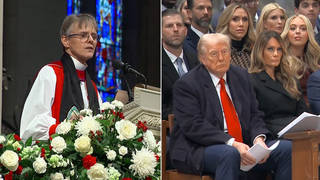
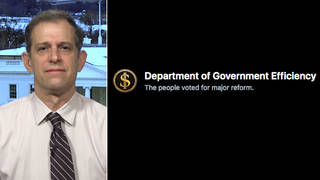
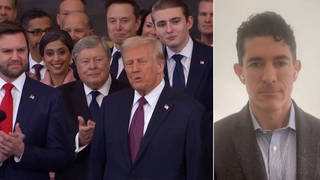
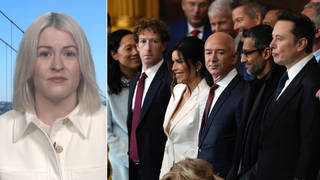





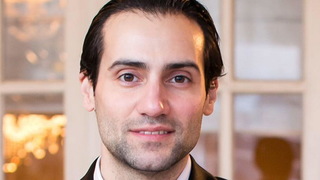
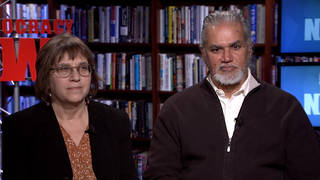
Media Options